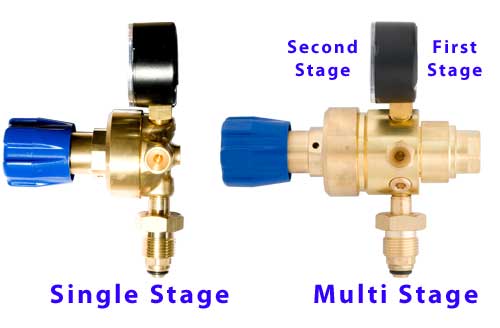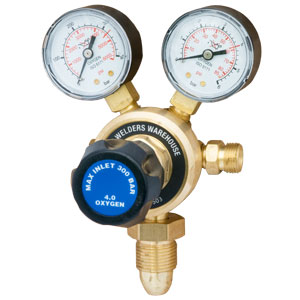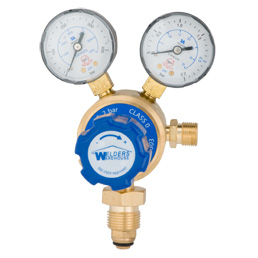01908 6998020845 899 4400 | 01908 699802Tel 01908 699802
Whats the difference between Single Stage and Multi Stage Regulators


As some of you may prefer to watch rather than read, I’ve also produced a VIDEO on this subject.
Single Stage Regulators
A Single Stage Regulator takes Cylinder Pressure and reduces it down to an adjustable pressure output.
For example, in the case of an Oxygen Cylinder, the cylinder pressure of up to 300 bar (4410 psi) is reduced in a single step to the output of 0-4 bar (for example).
The main advantage of a Single Stage Regulator is price. Simply put, they’re cheaper than Multi Stage Regulators.
The downside is Single Stage Regulators have a less stable output, especially at low pressure settings.
Where Single Stage Regulators are used for high output applications, it will be necessary to adjust the pressure from time to time. This is because as the cylinder pressure drops, the output pressure will creep up.
Multi Stage Regulators
A Multi Stage Regulator is a bit like having two Single Stage Regulators in one!
The first, non adjustable stage, reduces Cylinder Pressure to around 10 bar (can be up to 20 bar).
The adjustable 2nd stage is used to deliver the output pressure required by the operator.
This means when you adjust the Regulator, you are only dropping the pressure from between 10 or 20 bar to your desired output pressure. Not up to 300 bar down to desired output pressure!
Multi Stage Regulators offers two key advantages over Single Stage Regulators.
Multi Stage Regulator Output pressure is more stable.
Reducing cylinder pressure in 2 steps results in greater output pressure stability and consistency. Stable, Consistent output pressure is especially important where a very low pressure is required – very small flame torches for example.
Secondly, where high gas consumption is used, the delivery pressure is more consistent over the life of the cylinder. This is because as cylinder pressure drops, a Single Stage Regulator will gradually deliver a higher and higher gas pressure. This will necessitate regular adjustment to maintain delivery pressure.
A Multi Stage Regulator offers much more consistent output pressure because the depleting cylinder pressure has little effect on the adjustable second stage.
How to tell the difference between Single & Multi Stage Regulators

From the front, Single Stage and Multi Stage Regulators look very similar.
But you can see from the above image, a Multi Stage Regulator has the 1st Stage protruding from the rear. This is the most obvious visual difference between the two types!
Conclusions
If you need your Gas Regulators to be cheap, Single Stage Regulators are likely to be your best choice.
If consistency of delivery pressure during high gas consumption applications is important to you, Multi Stage Regulators are likely to be a better choice.
If you use micro torches (Model ‘O’ or Little Torch for example), the greater outlet pressure stability of Multi Stage Regulators will be a significant advantage for you.
I hope you found this blog article about the difference between Single Stage and Multi Stage Regulators useful.
View our range of Gas Regulators
Please let me know what you thought of this article by leaving a comment.
Don’t worry, your email address won’t be added to a database or shared and you won’t receive any unsolicited email.
Cheers
Graham




Grete Infromation
Great article. Came at just the right time into my Inbox on the very day I bought a regulator! Thanks Graham.
Hi Keith
Thanks for the comment, glad you found the article on Single and Multi Stage Regulators useful.
Cheers Graham
Helpful article, thank you. My question is, because the single stage and two/multi stage regulators look alike, is there a visible or easy way to know if a regulator is single or multi-stage? Thank you.
Hi Donna
Thanks for the comment. Yes there is an easy way to tell the difference. A Multi Stage Regulator will have a protrusion sticking out at the rear (not well described, sorry 🙂 this is the FIRST STAGE. A Single Stage Regulator will not have this protrusion at the rear.
In addition to the blog article, I’ve also produced a video that shows the difference by comparing the rear of the Regulators.
You can also see the protrusion I refer to on our Oxygen Multi Stage Regulator Product page by clicking the middle thumbnail picture under the main photo.
Hope that helps
Kind Regards
Graham
Hi Donna
I’ve now updated this article to include a photo showing a Single Stage and Multi Stage Regulator from the side. This allows you to see the difference.
Hope it helps.
Regards
Graham
Hi, Graham. My thanks for the information and your video. Is the same protection offered (against increasing delivery pressure) by adding a second 1-stage regulator after the first 1-stage regulator, as you would get from a single, two-stage regulator?
Hi Dave
Thanks for your comment, and you’re welcome!
You can’t put second Single Stage Regulator on the output of a Single Stage Regulator that’s connected to a Cylinder as the pressure going into the second Regulator would be far to low (designed for Cylinder Pressure).
If you want a Two Stage Regulator, I’m afraid you have to buy a Two Stage Regulator, sorry 🙂
Cheers
Graaam
I understood very well.
Your explanation was Good, Good & Good all the way.
Hi Gautam
Glad you found the article helpful.
Regards Graham
Meaningful information
Glad you found the information useful.
Cheers Graham
Very interesting, I didn’t know properly the difference single and twin stage relative to my application thank you
Hi Patrick
Thanks for the comment, glad you found the article interesting and useful.
Cheers Graham
TANK YOU .
You’re welcome Desmond, cheers Graham